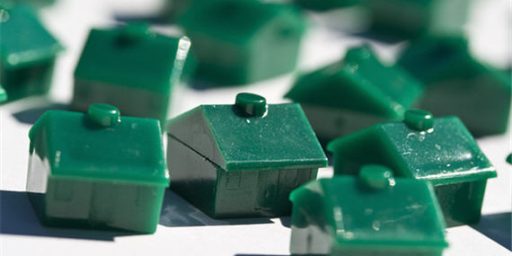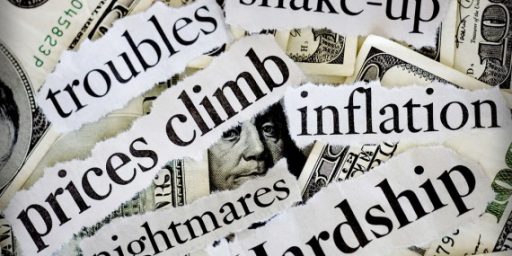Housing Bubble a Trillion-Dollar Bet
The media’s potential self-fulfilling prophecy continues with yet another story on the potential housing bubble in today’s New York Times.
The Trillion-Dollar Bet (NYT | RSS)
American homeowners have made a trillion-dollar bet that mortgage rates will remain near record lows for at least a few more years. But with some interest rates already rising, economists worry that the bet could turn bad. The problem is that new types of mortgages that hold down monthly payments for families – helping many buy homes that they would not otherwise be able to afford – also require potentially far higher payments in future years. The bill will soon start to come due in a serious way, as the initial period of fixed payments, typically set at artificially low rates, expires for millions of homeowners with adjustable-rate mortgages.
This year, only about $80 billion, or 1 percent, of mortgage debt will switch to an adjustable rate based largely on prevailing interest rates, according to an analysis by Deutsche Bank in New York. Next year, some $300 billion of mortgage debt will be similarly adjusted. But in 2007, the portion will soar, with $1 trillion of the nation’s mortgage debt – or about 12 percent of it – switching to adjustable payments, according to the analysis. The 2007 adjustments will almost certainly be the largest such turnover that has ever occurred.
The impact is not likely to derail the economy on its own, economists predict, but it will probably slow growth. For individual families, the problems could be significant. “I’m not sure that people are being counseled on really how big of a risk they are taking,” said Amy Crews Cutts, deputy chief economist at Freddie Mac, the mortgage company.
Consider a typical $300,000 interest-only mortgage with fixed payments for the first five years. The homeowner would start by paying about $1,250 a month. If interest rates rise modestly over the next few years, as many forecasters expect, the payment will jump to almost $2,100 in 2010, according to Stephen Barrett, the owner of Redmond Financial, a mortgage business near Seattle.
With the help of new computer models, lenders have brought out newer and riskier mortgages to attract borrowers and increase their buying power during the long housing boom. The traditional 30-year mortgage with guaranteed payments is increasingly a loan of the past.
There’s a reason for that: Conventional mortgages generally only make sense if one keeps the house for seven years or more. Most people relocate or upgrade within that period.
Further, the typical adjustable rate mortgage is fixed for the first five years. The scenario above presumes that the homeowner is forced to pay the new market rate at the end of that period. However, an ARM is like a British election: It comes due in five years but the homeowner can decide, at literally any time during his term, to hold a new election — refinance. If someone entered into an ARM three years ago and anticipates keeping the place another five years, it may well make sense to eat the refinancing costs for the added security.
Related:





No, no, no! Stop with the rational thought and free market babble.
They need a housing bubble or something to burst so they can blame it on Bush / the Republicans in time for the 2008 election.
If you think the consequences of this are bad, just think about all those people snatching up interest-only loans. Rates go up, housing prices plummet, and millions of consumers are stuck with a principal balance they can’t even pay off by selling their houses…. Ouch.
HARVARD’S CENTER FOR HOUSING STRUDIES RELEASED A REPORT THIS WEEK WHICH CONCLUDED THERE IS NO HOUSING BUBBLE, AND NO GREATER RISK NOW THAN AT ANY TIME IN THE RECENT PAST.
THE SO-CALLED HOUSING BUBBLE CHARGE IS COOKED UP BY A DESPERATE LEFT TRYING TO HURT BUSH.
MORE HERE:
http://www.usnews.com/usnews/biztech/articles/050616/16finance.htm
AND HERE:
http://www.jchs.harvard.edu/publications/markets/son2004.pdf